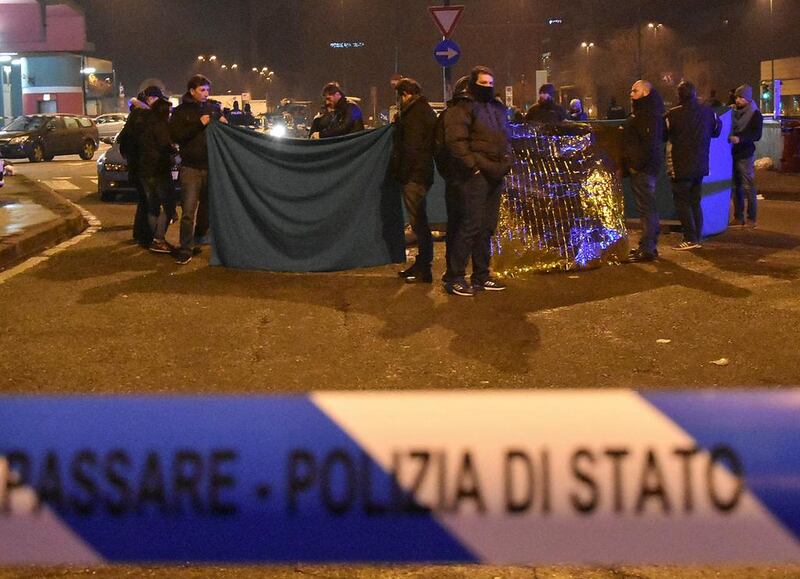BERLIN / CAIRO // The main suspect in the Berlin Christmas market attack was shown pledging allegiance to the Islamic State group in a video released on Friday.
The video, released by Amaq, a website linked to ISIL, showed Tunisian Anis Amri, who was killed when he opened fire on Italian police on Friday, pledging allegiance to ISIL chief Abu Bakr Al-Baghdadi.
The two-minute, 42-second video showed Amri speaking directly to a camera while standing outdoors wearing a winter coat and earphones. It was unclear exactly where or when the video was filmed.
Amri also declared his desire to avenge Muslims killed in air strikes and called for attacks against “crusaders”. After four days on the run, he was shot dead by an Italian police officer in Milan after he pulled a gun when he was stopped during a routine identification check at around 3am near the city’s Sesto San Giovanni railway station.
ISIL had claimed responsibility for the Berlin attack and Amaq had earlier said the man shot dead in Italy on Friday had carried it out, calling him “a soldier of the Islamic state” whose actions were “in response to appeals to target citizens of coalition countries.” Germany is part of a US-led coalition fighting ISIL in Iraq and Syria..
German authorities are now investigating whether Amri, who turned 24 on Thursday, acted alone in the attack in Berlin or whether he had accomplices. Federal prosecutor Peter Frank said there were still many unanswered questions, not least whether the gun Amri had in Milan was the one he used to shoot the Polish driver of the lorry that ploughed into the crowds in Berlin last Monday.
“It is very important for us to determine whether there was a network of accomplices ... in the preparation or the execution of the attack, or the flight of the suspect,” said Mr Frank.
German interior minister Thomas de Maiziere later thanked Italian police for their swift action, saying the officers had been “especially brave” and done “excellent work”.
He said a team of German federal police was on the way to Italy to assist in the case which demonstrated “the enormous importance of European and transatlantic cooperation in the fight against terror”.
However he warned: “Although this manhunt was successful, the threat of terrorism is unchanged for Germany. It remains high, the security authorities remain vigilant.”
The federal police chief Holger Muench said that “hundreds of investigators” would be working on the case throughout the Christmas holidays beginning Saturday.
Amri became prime suspect after police found documents and fingerprints in the lorry and it emerged that he had been in trouble with the law before and had been refused asylum in Germany.
In Rome, Italy’s interior minister Marco Minniti said fingerprints supplied by Germany had established Amri’s identity “without a shadow of a doubt.”
The German authorities issued “Wanted” posters of Amri, describing him as “armed and violent.” and offering a 100,000 euro reward for information leading to his arrest.
The Tunisian arrived in Milan from BErlin via Chambery in France and Turin, according to a train ticket police found on his body. French officials refused to comment on his passage through France, which has increased surveillance on its trains after both recent French attacks and the Berlin massacre.
When he was stopped and asked to show his papers, he pulled a pistol from his backpack and fired on officer Christian Movio, 36, wounding him in the shoulder. The other officer, Luca Scata, who is still a trainee, then shot Amri dead. On Friday, tributes flooded in for Mr Scata, the 29-year-old rookie who fired off two rounds after Amri opened fire on his partner. Witnesses said the two policemen had then crouched over Amri to try to keep him alive, but the Tunisian died after ten minutes.
Mr Scata, a Sicilian, had only been in the police for nine months and was three months into a probationary period in Milan when he was put to the ultimate test.
Mr Movio is in hospital but his condition is not life-threatening. “My partner’s actions were exemplary, he reacted immediately when the pistol came out,” he said.
Italian prime minister Premier Paolo Gentiloni personally informed German chancellor Angela Merkel that Amri had been captured. He praised the two young police officers for their courage, but also called for greater cross-border police cooperation, suggesting some dismay that Europe’s open border policy had enabled Amri to easily move around despite being Europe’s No. 1 fugitive.
Earlier, Amri’s brother in Tunisia had urged him to give himself up to the police, but said he had had no contact with him since Amri left Tunisia after the 2011 uprising in the country.
The district of Milan where the shoot-out occurred was once home to industrial plants but residents said it had fallen into decay.
“This area used to be full of Milan’s biggest industrial plants. but there’s an influx of many illegal immigrants, so we are worried,” said Giovanni Di Gioia, 51, who is unemployed.
This week Italian authorities have increased security measures in Rome, the nation’s capital, and Milan, its business centre, after the Berlin attack. City officials installed concrete barricades surrounding Milan’s landmark cathedral, and soldiers and patrol the nearby Christmas market.
*Bloomberg
* Agence France Presse





